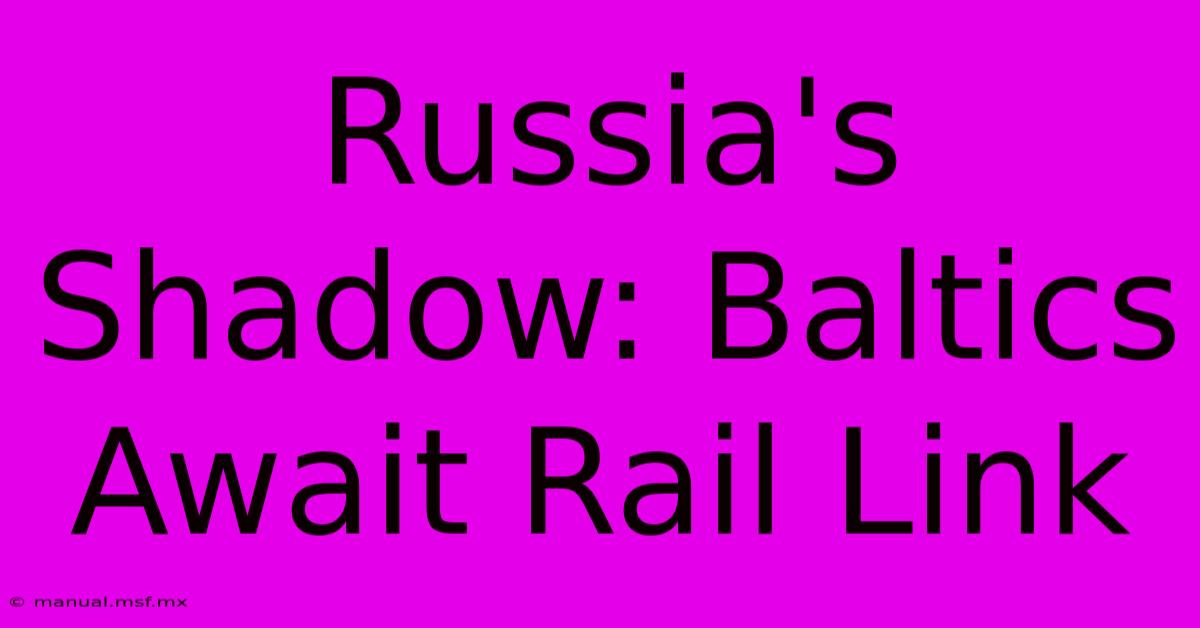Russia's Shadow: Baltics Await Rail Link

Discover more detailed and exciting information on our website. Click the link below to start your adventure: Visit Best Website. Don't miss out!
Table of Contents
Russia's Shadow: Baltics Await Rail Link - Unlocking Trade and Facing Geopolitical Challenges
Can a rail link bridge the Baltics and Russia, fostering economic growth while navigating geopolitical tensions? The prospect of a new rail link between the Baltic states and Russia has sparked debate, highlighting the potential for increased trade and investment while simultaneously raising concerns about geopolitical dependence and security risks. Editor Note: Russia's Shadow: Baltics Await Rail Link has been published today. This topic is essential to read because it provides a nuanced understanding of the complex economic and geopolitical landscape surrounding the Baltic states, highlighting the opportunities and challenges of increased connectivity with Russia.
Analysis: This article delves into the potential benefits and drawbacks of a Baltic-Russia rail link, examining the economic and political implications. We analyzed recent developments, expert opinions, and historical context to create a comprehensive overview of the topic.
Key Takeaways:
| Aspect | Description |
|---|---|
| Economic Potential | Increased trade, investment, and economic growth |
| Geopolitical Dependence | Increased vulnerability to Russian influence and control |
| Security Concerns | Potential for Russian military activities and weapon transportation |
| Alternative Transportation | Existing infrastructure and potential for strengthening other modes of transport |
Baltic-Russia Rail Link: A Bridge of Opportunity and Uncertainty
Economic Potential: A direct rail link between the Baltics and Russia could significantly boost economic growth, facilitating trade in goods, services, and resources. Increased access to Russian markets would provide opportunities for Baltic businesses, enhancing export potential and attracting foreign investment. Furthermore, a more efficient transportation network could lower costs, enhancing competitiveness for Baltic companies.
Geopolitical Dependence: However, a closer economic relationship with Russia could raise concerns about increased dependence on Moscow's political and economic goodwill. The potential for Russian influence in the Baltic region's decision-making processes, coupled with Russia's history of using energy resources as leverage, creates a delicate balance between economic benefits and potential political risks.
Security Concerns: The rail link's security implications are a significant point of contention. Concerns about potential Russian military activities, weapon transportation, and the potential for disrupting vital transportation routes add another layer of complexity. The threat of potential disruption of critical infrastructure, either intentional or accidental, could significantly impact the Baltic states' security and stability.
Alternative Transportation: The focus on a rail link should not overshadow alternative transportation options. Investing in existing infrastructure, such as port facilities and air cargo transport, can diversify the Baltic states' transport network, reducing reliance on Russia. Additionally, strengthening partnerships with other European countries can provide alternative routes for goods and services, further mitigating dependency on Russia.
Navigating the Complex Landscape: The potential for a Baltic-Russia rail link presents a complex interplay of economic opportunities and geopolitical concerns. A careful assessment of all factors, including economic benefits, security implications, and geopolitical ramifications, is crucial for the Baltic states to make informed decisions about their future connectivity. By prioritizing regional cooperation, diversifying transportation infrastructure, and engaging in constructive dialogue with Russia, the Baltic states can navigate this complex landscape, fostering economic growth while safeguarding their security and autonomy.
The Future of Connectivity: The decision regarding a Baltic-Russia rail link is not merely about infrastructure but about the long-term vision for the region's geopolitical landscape. By carefully considering all aspects and pursuing responsible development strategies, the Baltic states can strive for economic prosperity while ensuring their continued independence and security.

Thank you for visiting our website wich cover about Russia's Shadow: Baltics Await Rail Link. We hope the information provided has been useful to you. Feel free to contact us if you have any questions or need further assistance. See you next time and dont miss to bookmark.
Also read the following articles
| Article Title | Date |
|---|---|
| Krasinski Reveals Blunts Reaction To His Honor | Nov 14, 2024 |
| Frosinone Rissa Tra Extracomunitari Due Feriti | Nov 14, 2024 |
| John Lewis Christmas Ad Emotional Or Overdone | Nov 14, 2024 |
| India Beats South Africa In Close Match | Nov 14, 2024 |
| Resolute Mining Shares Dive After Ceo Detained | Nov 14, 2024 |
| Wembanyama Match Crucial Ce Soir | Nov 14, 2024 |
| Enquete A Fazenda 16 Flora Gizelly E Vanessa | Nov 14, 2024 |
| Bonus Natale 2024 Indennita Da 100 Euro | Nov 14, 2024 |
| David Coote And Premier League Referees | Nov 14, 2024 |
| Bevo Roeselare Wint Van Saturnus Michelbeke | Nov 14, 2024 |
